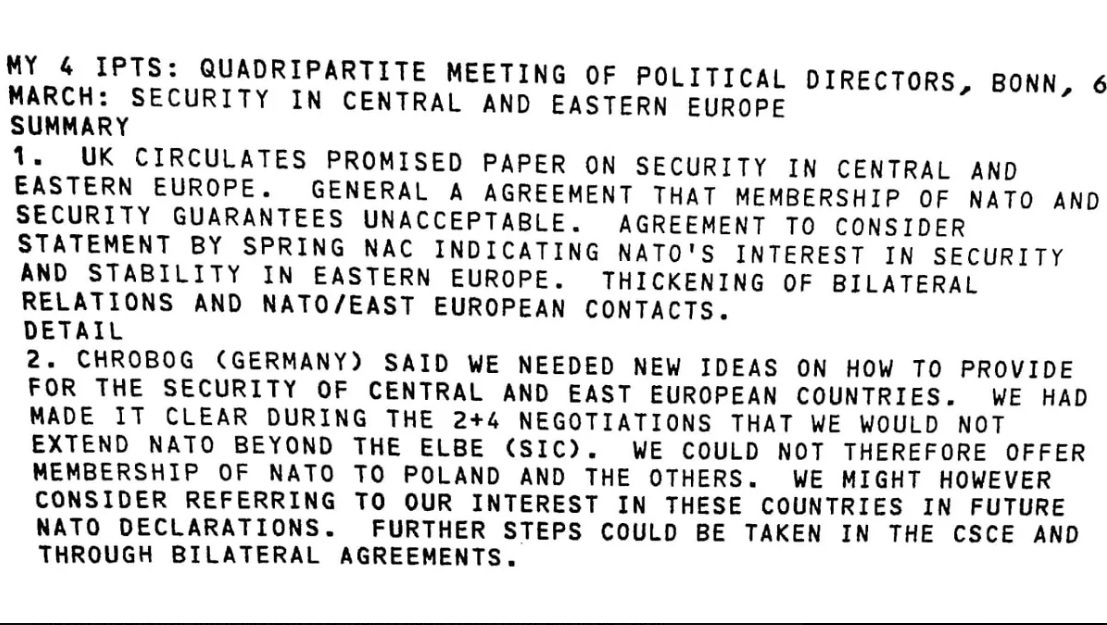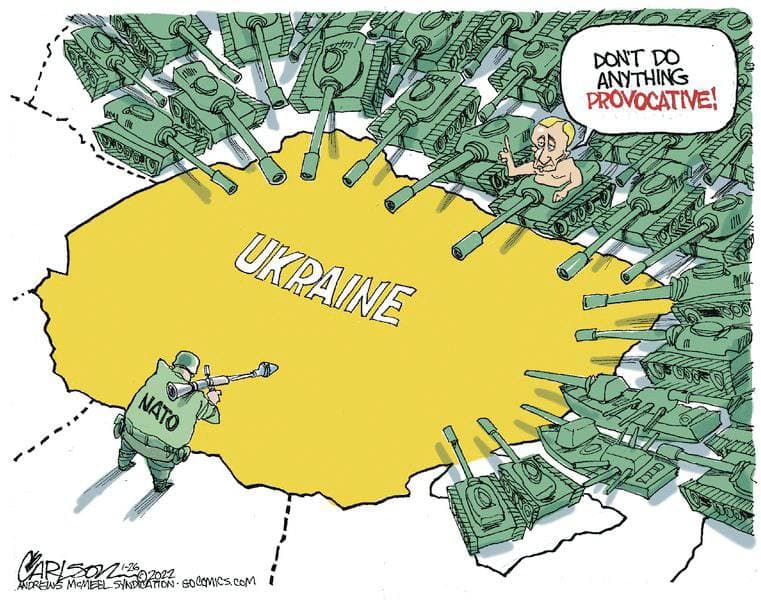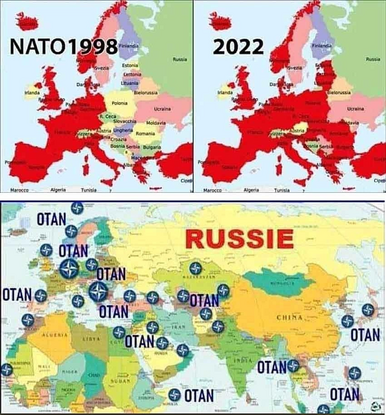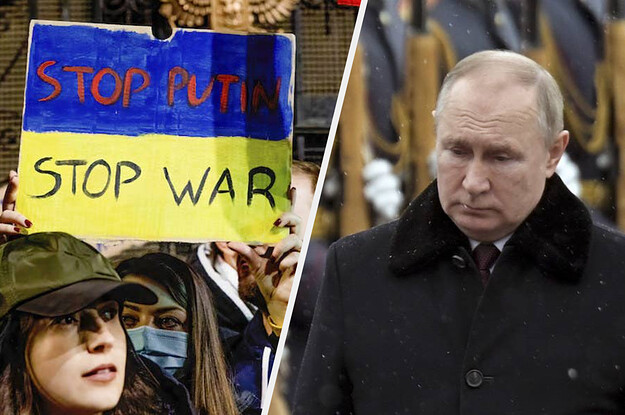NATO deceived Russia about expansion and a British document proves it, top German weekly discovers
A newly discovered document from March 1991 shows US, UK, French, and German officials discussing a pledge made to Moscow that NATO would not expand to Poland and beyond. Its publication by the German magazine Der Spiegel on Friday comes as expansion of the US-led bloc has led to a military standoff in Eastern Europe.
The minutes of a March 6, 1991 meeting in Bonn between political directors of the foreign ministries of the US, UK, France, and Germany contain multiple references to “2+4” talks on German unification in which the Western officials made it “clear” to the Soviet Union that NATO would not push into territory east of Germany.
“We made it clear to the Soviet Union – in the 2+4 talks, as well as in other negotiations – that we do not intend to benefit from the withdrawal of Soviet troops from Eastern Europe,” the document quotes US Assistant Secretary of State for Europe and Canada Raymond Seitz.
“NATO should not expand to the east, either officially or unofficially,” Seitz added.
A British representative also mentions the existence of a “general agreement” that membership of NATO for eastern European countries is “unacceptable.”
“We had made it clear during the 2+4 negotiations that we would not extend NATO beyond the Elbe [sic],” said West German diplomat Juergen Hrobog. “We could not therefore offer Poland and others membership in NATO.”

Screenshot of the minutes of a March 6, 1991 meeting of US, UK, French and German diplomats discussing NATO and Eastern Europe © screenshot via Kommersant
The minutes later clarified he was referring to the Oder River, the boundary between East Germany and Poland. Hrobog further noted that West German Chancellor Helmut Kohl and Foreign Minister Hans-Dietrich Genscher had agreed with this position as well.
The document was found in the UK National Archives by Joshua Shifrinson, a political science professor at Boston University in the US. It had been marked “Secret” but was declassified at some point.
Shifrinson tweeted on Friday he was “honored” to work with Der Spiegel on the document showing that “Western diplomats believed they had indeed made a NATO non-enlargement pledge.”
Honored to work with @derspiegel's Klaus Wiegrefe in drawing attention to British documents (cc: @UkNatArchives) from 1990-1991 showing senior Western diplomats believed they had indeed made a NATO non-enlargement pledge. Link below:https://www.spiegel.de/ausland/nato-osterweiterung-aktenfund-stuetzt-russische-version-a-1613d467-bd72-4f02-8e16-2cd6d3285295
— Josh Shifrinson (@shifrinson) February 18, 2022
“Senior policymakers deny a non-expansion pledge was offered. This new document shows otherwise,” Shifrinson said in a follow-up tweet, noting that “beyond” the Elbe or Oder by any standard includes Eastern European countries to which NATO started expanding just eight years later.
During a major press conference in December 2021, Russian President Vladimir Putin said the West had promised the Soviet Union NATO would not expand “a single inch” to the east, but “brazenly deceived” and “cheated” Moscow to do just that.
Responding to these comments, NATO Secretary General Jens Stoltenberg said the alliance “has never promised not to expand.” In an interview with Der Spiegel later, Stoltenberg repeated that “there has never been such a promise, there has never been such a behind-the-scenes deal, it is simply not true.”
NATO admitted Poland, Hungary, and Czechia in March 1999, just before launching an air war against Yugoslavia without the permission of the UN Security Council. This put NATO directly on the Russian border – the enclave of Kaliningrad – for the first time ever. The next round of expansion in 2004 included the former Soviet republics of Estonia, Latvia, and Lithuania, placing NATO’s eastern frontier just 135 kilometers (84 miles) from St. Petersburg.
In a series of security proposals made public in December, Russia demanded NATO publicly renounce expansion to the former Soviet republics of Ukraine and Georgia and withdraw US forces to the 1997 boundaries of the bloc, among other things. The US and NATO have rejected this, arguing the alliance’s “open door” membership policy is a fundamental principle for them.
Despite their denials, Western leaders did make a promise to the USSR that NATO would not expand to Central and Eastern Europe when Moscow agreed to Germany’s reunification, Willy Wimmer, a former vice president of the Organization for Security and Co-operation in Europe (OSCE), has claimed in an interview with RT on Saturday.
The veteran politician, who served as parliamentary secretary to Germany’s defense minister between 1985 and 1992, said that he personally witnessed this promise when he “sent Chancellor Helmut Kohl the statement on the Bundeswehr in NATO and NATO in Europe, which was completely incorporated into the treaties on reunification.”
Berlin’s decision at that time “not to station NATO troops on the territory of the former East Germany and to stop NATO near the Oder” was part of this promise, Wimmer added.
The bloc has long denied such a promise had ever been made, insisting it has always had an 'open door policy.' However, a document recently published by Germany’s Der Spiegel weekly purportedly shows that the pledge was made, supporting Moscow's claims the commitments were later broken.
The minutes of a March 6, 1991 meeting in Bonn between the political directors of the foreign ministries of the US, UK, France, and Germany on German reunification appear to show that the Western nations made it “clear” to the still-existing Soviet Union that NATO would not expand further to the east.
Wimmer believes that the promises made by the Western leaders in the early 1990s were eventually dashed by the US ambitions formulated in the infamous 1992 ‘Wolfowitz Doctrine’.
The ‘doctrine’ was in fact a Defense Planning Guidance for the 1994–1999 fiscal years that was leaked to the New York Times at that time and sparked a wave of criticism even in the US itself. The document outlined the policy of unilateralism and pre-emptive military actions designed to suppress potential threats and prevent any supposedly authoritarian states from becoming superpowers. The official text of the guidance was then changed following the uproar but many tenets of the ‘doctrine’ still found their way into the former US President George W. Bush’s foreign policy.
Since that time, the US and its allies have been on the “wrong track” as they have been virtually doing everything to create a fairly “justified” impression in Moscow that the Western nations seek to “kick Russia out of Europe, to build a new wall between the Baltic and the Black Sea” and eventually to “destroy” Russia instead of cooperating with it, Wimmer pointed out.
The root of all the current security problems in Europe lies within America’s policy of continuously antagonizing Russia, according to Wimmer. “All the misery we are dealing with started with the United States conducting the policy aimed at kicking Russia out of Europe for the last 20 or almost 30 years,” he said.
As long as the US continues to “do everything to achieve this goal” both through NATO and bilateral agreements, Europe’s security problems can hardly be resolved, Wimmer warned, adding that it was Washington that should fundamentally change its ways.
The former OSCE vice president also echoed Russian Foreign Minister Sergey Lavrov, describing the present state of relations between Russia and the West as a conversation between “a mute” and a “deaf.” Moscow's top diplomat made similar remarks earlier in February following talks with British Foreign Secretary Liz Truss.
The US and its partners in Europe have been “certainly deaf” for decades since they “drew no conclusions” from Russian President Vladimir Putin’s landmark speech at the Munich Security Conference back in 2007, when he showed quite clearly “where the problems lie on the Euro-Asian continent,” Wimmer said.
At that time, the Russian leader warned that US unilateral hegemonism and “uncontained” use of force in international relations erode the global security system and weaken international law. It was also one of the first times he mentioned NATO’s promise to Russia not to expand to the east.



